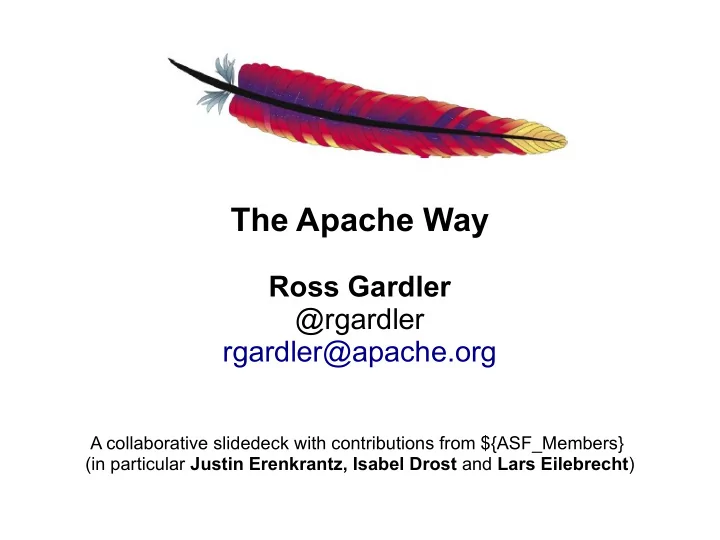

The Apache Way Ross Gardler @rgardler rgardler@apache.org A collaborative slidedeck with contributions from ${ASF_Members} (in particular Justin Erenkrantz, Isabel Drost and Lars Eilebrecht )
Who is this Ross Gardler? Ross Gardler Vice President of Community Development The Apache Software Foundation rgardler@apache.org @rgardler
What is the Apache Way?
First, some history
Informal collaboration (1995) ● Apache Group ● 8 people ● sharing code on abandoned NCSA httpd ● Apache web server releases ● 0.6.2 (first public release) April 1995 ● 1.0 released 1 st December 1995
A Foundation (1999) ● Commercial opportunities ● Formal legal structure required ● Membership based charity ● IRS 501(c)3 ● Donations by individuals tax-deductible (in US) ● First ApacheCon March 2000 ● Apache 2.0 Alpha 1 ● First EU ApacheCon October 2000
Today ● Over 190 projects ● Over 90 “Top Level” Projects ● Over 50 “Incubating” projects ● Over 30 “Lab” projects ● Over 16 “Attic” projects ● Over 2600 committers ● Over 350 members ● Over 4000 Independent Contributor Licence Agreements
Foundation Structure
Top Level Projects
Not all “plain sailing” ● Jakarta “Foundation” ● Jakarta was an “Umbrella” for all Java projects ● Successful brand in its own right ● Tomcat, Struts, Ant and many more innovations ● Started to copy foundation structure ● “Mini”-board … but problems arose … ● Avalon: Who was responsible?
Importance of Oversight ● Jakarta demonstrated that Umbrellas are bad ● Flattened organisational structure ● Jakarta projects became top level projects ● All projects submit board reports quarterly ● Community focussed ● Not technical focus ● Board can, and does (occasionally) intervene ● On community issues only
The Apache Ecosystem
Don't pick winners, pick runners ● Board does not say “we want X” ● Developers say “X is cool” ● We enable developers to do cool stuff ● Apache developers are at the forefront of innovation ● Not interested in a single runner ● We want relay teams ● Community is critical to the Apache Way ● Apache is about support communities
(nearly) All volunteer work ● If you want something done ● Volunteer on the appropriate committee ● A few paid contractors ● Press ● Infrastructure ● Administration ● No paid committers
The Apache Way
Types of contribution ● Any constructive contribution earns merit ● Permissively licensed only ● Not just code ● Evangelism ● Bug reports and triage ● Testing ● Documentation ● Design feedback ● User support ● Etc.
All contributions are equal ● Merit does not buy you authority ● The community must still agree ● Merit buys you privileges, e.g. ● Commit access ● Conflict resolution capabilities
Decisions Making ● Most decisions are reversible ● “If it didn't happen on the list, it didn't happen” ● Uncontroversial or small changes ● Lazy Consensus – assume it's OK – JFDI ● Controversial, irreversible or large changes ● Propose then wait a minimum of 72 hours
Finding that list! ● Listed on project website ● dev@project.apache.org ● Primary list ● commits@project.apache.org ● Automated source change notification ● users@proejct.apache.org (optional) ● User-to-user support ● http://mail-archives.apache.org
No Jerks Allowed! ● Most people are nice ● We all have bad days ● Some are, well, Jerks ● Trolls exist ● DO NOT FEED ● Don't become a poisonous person “How Open Source Projects Survive Poisonous People (And You Can Too)” by Ben Collins-Sussman and Brian Fitzpatrick http://video.google.com/videoplay?docid=-4216011961522818645
Business and the Apache Way
Permissive License
Thanks for listening! Question? The Apache Way Ross Gardler @rgardler rgardler@apache.org A collaborative slidedeck with contributions from Justin Erenkrantz and Isabel Drost
Recommend
More recommend